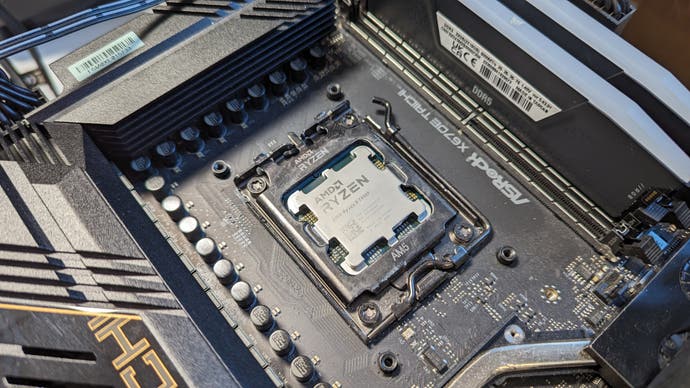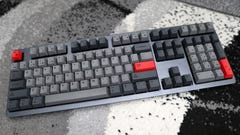AMD Ryzen 5 7500F review: a great value gaming CPU if you can get it
This OEM special does the business.
AMD's current-generation Ryzen 7000 processors have proven to be some of the fastest gaming CPUs on the planet, but even the entry-level Ryzen 5 7600 and Ryzen 5 7600X CPUs are still a fairly big investment at $225/~£220 and $245/£240. Happily, there's now an even cheaper model - the Ryzen 5 7500F - which cuts frequencies by a fairly insignificant 100MHz and drops the integrated graphics in exchange for a lower purchase price: $200 in the US or £255 in the UK with an A620 motherboard worth £80, working out to around £175 for the CPU itself.
British system builder AWD-IT is one of only a handful of retailers offering the chip - in a range of Ryzen 5 7500F plus motherboard bundles and pre-built systems - and they've graciously sent it over with its bundled AMD Wraith CPU cooler for us to test. We've now run it through our battery of game benchmarks and content creation workloads to see how it compares to a wide range of competitors, from the similarly-affordable Ryzen 5 7600X and Core i5 13400F to the high-end Ryzen 9 7950X3D, Ryzen 7 7800X3D and Core i9 14900K.
The question we want to answer here is simple: is there any convincing reason to choose the Ryzen 5 7600X or 7600 over the 7500F beyond broader retail availability? In previous Ryzen generations, the cheapest CPU at a given core count was often the best value option, but it's sensible to test that assumption with these new Zen 4 parts.

| CPU design | Boost | Base | L3 cache | TDP | RRP | |
|---|---|---|---|---|---|---|
| Ryzen 9 7950X3D | Zen 4 16C/32T | 5.7GHz | 4.2GHz | 128MB | 120W | $699/£699 |
| Ryzen 9 7950X | Zen 4 16C/32T | 5.7GHz | 4.5GHz | 64MB | 170W | $699/£739 |
| Ryzen 9 7900X3D | Zen 4 12C/24T | 5.6GHz | 4.4GHz | 128MB | 120W | $599/£599 |
| Ryzen 9 7900X | Zen 4 12C/24T | 5.6GHz | 4.7GHz | 64MB | 170W | $549/£579 |
| Ryzen 9 7900 | Zen 4 12C/24T | 5.4GHz | 3.7GHz | 64MB | 65W | $429/£519 |
| Ryzen 7 7800X3D | Zen 4 8C/16T | 5.0GHz | 4.2GHz | 96MB | 120W | $449/£375 |
| Ryzen 7 7700X | Zen 4 8C/16T | 5.4GHz | 4.5GHz | 32MB | 105W | $399/£419 |
| Ryzen 7 7700 | Zen 4 8C/16T | 5.3GHz | 3.8GHz | 32MB | 65W | $329/£349 |
| Ryzen 5 7600X | Zen 4 6C/12T | 5.3GHz | 4.7GHz | 32MB | 105W | $299/£319 |
| Ryzen 5 7600 | Zen 4 6C/12T | 5.1GHz | 3.8GHz | 32MB | 65W | $229/£249 |
| Ryzen 5 7500F | Zen 4 6C/12T | 5.0GHz | 3.7GHz | 32MB | 65W | $200/£255* |
*Includes A620 motherboard
As you can see from the table above, there's very little separating the Ryzen 5 7500F and 7600, with a relatively modest step up to the 7600X from there. All told, the difference in quoted boost frequencies from the cheapest to most expensive six-core Ryzen CPU accounts for just 300MHz or just over five percent.
The cache configuration is also the same, and all three six-core Zen 4 CPUs support the same PCIe 5.0 devices (something not always a given, eg the Ryzen 5600G not supporting PCIe 4.0 due to its providence from laptop processors).
The 7600X also has a higher rated TDP, but can be set to the same 65W 'eco' setting as the 7500F if desired - while the 7500F can have its power limits maximised to match the 7600X. The 7500F also lacks integrated graphics, though this feature tends to remain unused on gaming-focused systems with discrete graphics cards.
For our testing, we're using the same basic setup as our Ryzen 7800X3D review. That means G.Skill Trident Z5 Neo DDR5-6000 CL30 RAM and Asus' RTX 3090 Strix OC. Cooling is provided by an Eisbaer Aurora 240mm AiO. Our motherboard for AMD Ryzen 7000 CPUs is the ASRock X670E Taichi, while the Gigabyte Aorus Z790 Master takes care of our Intel CPUs.
For storage, we're using a 4TB Lexar NM790 PCIe 4.0 NVMe SSD - benchmarking has certainly been improved by the recent drop in NVMe SSD prices. Our rig is completed with a 1000W Corsair RM1000x power supply. Testing was performed with the latest Windows updates (22H2) and BIOS revisions (F11) installed.
Before we get into the gaming benchmarks that make up pages two to four, let's quickly run through some quick content creation benchmarks: a Cinebench R20 3D render and a Handbrake video transcode. These results are useful even in a gaming context as they set expectations for both single-core and multi-core performance in various scenarios.
Cinebench's R20 single-thread benchmark shows results a touch over what we'd expect to see from frequency alone, with a six percent advantage for the 7600 over the 7500F and a 13 percent advantage for the 7600X over the 7500F.
Things are much closer in the multi-core stakes, with just a one percent lead for the 7600 over the 7500F while the 7600X leads the 7500F by just nine percent. Of course, we'd expect to see a much smaller gap than that in gaming, where not every CPU core and thread is utilised in a given moment - and particularly as resolutions climb and GPU load increases.
| CB R20 1T | CB R20 MT | HB h.264 | HB HEVC | HEVC Power Use | |
|---|---|---|---|---|---|
| Ryzen 9 7950X3D | 788 | 13807 | 95.73fps | 40.70fps | 232W |
| Ryzen 9 7950X | 798 | 14837 | 105.15fps | 45.10fps | 368W |
| Ryzen 9 7900X | 791 | 11324 | 79.38fps | 33.77fps | 288W |
| Ryzen 7 7800X3D | 706 | 7108 | 52.99fps | 23.14fps | 190W |
| Ryzen 7 7700X | 768 | 7894 | 56.69fps | 25.95fps | 266W |
| Ryzen 5 7600X | 750 | 6063 | 44.35fps | 20.28fps | 236W |
| Ryzen 5 7600 | 706 | 5632 | 41.09fps | 18.72fps | 196W |
| Ryzen 5 7500F | 665 | 5574 | 40.78fps | 18.57fps | 193W |
| Ryzen 9 5950X | 637 | 10165 | 70.28fps | 30.14fps | 237W |
| Ryzen 7 5800X3D | 546 | 5746 | 42.71fps | 19.10fps | 221W |
| Ryzen 7 5800X | 596 | 6118 | 44.18fps | 19.50fps | 229W |
| Ryzen 5 5600X | 601 | 4502 | 31.75fps | 14.43fps | 160W |
| Core i9 14900K | 896 | 15962 | 103.12fps | 41.20fps | 433W |
| Core i5 14600K | 800 | 9349 | 62.68fps | 27.29fps | 288W |
| Core i9 13900K | 873 | 15570 | 104.67fps | 41.20fps | 473W |
| Core i5 13600K | 767 | 9267 | 62.37fps | 26.44fps | 254W |
| Core i9 12900K | 760 | 10416 | 70.82fps | 29.26fps | 373W |
| Core i7 12700K | 729 | 8683 | 57.64fps | 25.67fps | 318W |
| Core i5 12600K | 716 | 6598 | 44.27fps | 19.99fps | 223W |
| Core i5 12400F | 652 | 4736 | 31.77fps | 14.70fps | 190W |
| Core i9 11900K | 588 | 5902 | 41.01fps | 18.46fps | 321W |
| Core i5 11600K | 541 | 4086 | 29.00fps | 13.12fps | 250W |
It's a similar story in the Handbrake video transcode test, where our sample file is converted again nine percent faster on the 7600X than the 7500F in both H.264 and H.265 encodes, with the 7500F and 7600 within margin of error of each other. The increase in frequency is reflected in slightly higher power consumption on the higher-tier parts, with total system power peaking at 193W with the 7500F, 196W with the 7600 and 236W with the 7600X.
Now, let's get into the meat and potatoes of our testing - a range of games and scenes that test your CPU in different ways. Pick out your favourite titles from the links below or just hit the next page button to continue.
AMD Ryzen 5 7500F analysis
- Introduction, test rig and content creation benchmarks [this page]
- Gaming benchmarks: Flight Simulator 2020, Hitman 3, Ashes of the Singularity
- Gaming benchmarks: Counter-Strike: GO, Metro Exodus EE, Black Ops Cold War
- Gaming benchmarks: Cyberpunk 2077, Far Cry 6, Crysis 3 Remastered
- AMD Ryzen 5 7500F: the Digital Foundry verdict












